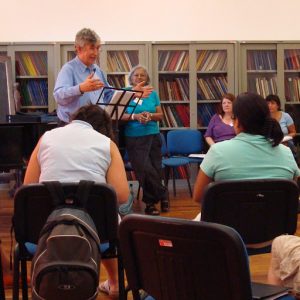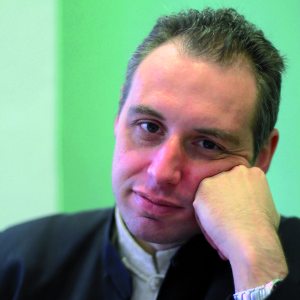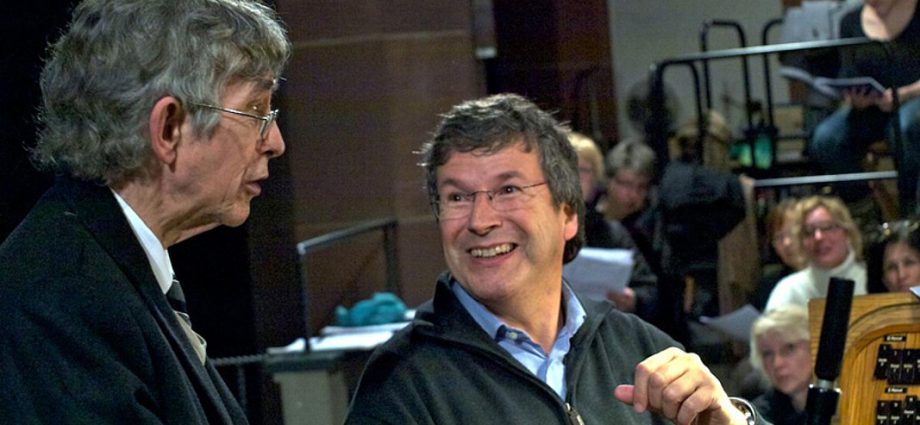by Aurelio Porfiri, composer, conductor, writer and educator
Some weeks ago, out of the blue, I learnt of the death of the British composer Colin Mawby. He was one of my very good friends, but in recent months we had not really been in touch, so I was not aware of the recent developments in his life. I just learnt that he passed away on 24 November 2019, at the age of 83. I felt truly sorry because I did not get the chance to talk with him before this fateful event.
I had been in contact with him on several occasions. He was a collaborator of my publishing company and generously sent me his music for publication. He was always very eager to collaborate and indeed we got along very well. He was also in juries in choral competitions where I was the director of the jury. And finally, when I was working in Macau, I had the chance to invite him as visiting professor to the university where I was working, so we spent several days together in Macau, China. On that occasion, I also carried out an interview with him, resulting in around 4 hours of audio, where he spoke about his life and ideas. I hope that soon I will be able to publish that interview in a book format, as a memory to this wonderful man.
Yes, because he was a wonderful man, very British (with that kind of British aplomb we identify, perhaps wrongly, with this name) but also very approachable and friendly. He was fond of life and its pleasures. He loved good food, good wine, beautiful women, and that for me is always a good sign of someone that knows how to enjoy this short pilgrimage we have here on earth.
He was also deeply religious, and we had many conversations about this topic, conversations that revealed our personal struggles and desires. For him of course, faith was a different matter compared to me. Even if we were both Catholics but being Catholic in the UK is certainly different from being Catholic in Italy. He had great respect for the tradition of sacred music and indeed he was also very careful in identifying the strength and weaknesses of the British choral tradition, as there are in any tradition. This does not mean he did not appreciate the great achievements of British choirs, but sometimes he found the sound of those choirs a little ‘cold’, and he was more appreciative of the sound of choirs from Latin countries, that were often not so perfect from a technical point of view, but certainly had a more expressive sound. As an example, let us see what he said in my blog Il Naufrago, that I coordinated years ago, and to which he was a contributor: “England has had a great influence on European performance but we need to understand its problems. Take what is good and discard the remainder.” I think this is quite a courageous statement from a British conductor, because let us not forget that he was not just a normal conductor: he was in charge of the choir of Westminster Cathedral for several years and then also managed other prestigious choirs. He tried to be very honest with his ideas and feelings about music, even if he deeply appreciated his own choral tradition. And he did not intend to discuss Anglican or Catholic traditions, he was just giving general assessments on the quality of the choral sound. When you really and honestly love something, you are also in the position to see the good and the bad, as I am sure is true for musicians all over the world.

Nevertheless, he certainly also admired some parts of his country’s choral tradition, and even more he loved the choral music tradition of the Church, a tradition that he contributed to a lot with his own compositions, the most famous of which is Ave Verum that is sung all over the world. Indeed, it was for that piece that I first contacted him by email many years ago. But then I discover other pieces by him: he published hundreds of pieces among which there are authentic gems of choral music. As I have said, he really loved choral music and its use within the Catholic tradition. This is what he said in another post for my blog: “On Good Friday I attended ‘Tenebrae’ at the Brompton Oratory in London. A superb choir was singing the wonderful Responsories by Victoria. The solemnity and dignity of the occasion was gripping and deeply moving. The Gregorian chant was beautiful and hearing the Lamentations sung in the ancient tone was transfixing. Truly the prophet Isaiah was again speaking to us from a distance of over two thousand years: I was listening to a chant that Christ would probably have heard. Although the liturgical reforms have had fine effects, we have also lost a lot. The sense of spirituality and reverence has been sadly diluted. We need to make an appraisal of what has been lost and restore the best of it to the liturgy. The souls of worshippers cry out for the sense of mystery: liturgy must be God centred and not man centred.” We should not forget that the role of Christianity in the development of choral music was huge, fundamental. He was a very good herald of this.
What kind of composer was he? He composed lots of choral music, mainly sacred music. Music that always had that kind of beautiful spiritual character. His way of composing was mostly harmonic – we often discussed about this. He was not really into the kind of counterpoint writing that probably is most used in countries like Italy, at least in the past and with some composers. We often talked of my late teacher, Domenico Bartolucci, for whom he had a deep admiration. There is also an interview he did with him and I think it is still available to see on YouTube. But his style, as I have said, was more harmonic, while still being very interesting and full of pathos and enriched by the deep knowledge he had of the choir. He really knew how to write for choirs in a very meaningful way. I think his music should certainly be performed more around the world because it is deeply inspired and deserving of better appreciation. Also, in some of his publications he re-harmonised chorales from the Christian tradition, that are also very interesting, and I am sure students would learn a lot from these publications because it is here that we can really experience his superior sense for good harmonic solutions and alternatives.
As I said at the beginning, he was a good and cheerful man. From our conversations, I felt he had not had an easy life, but he never lost that joie de vivre even later in life. In the field of choral and sacred music, he will certainly be missed, because he was a protagonist and he left a great heritage of his own compositions that can be performed by choirs with different technical abilities. As for me, I lost a dear friend and someone with whom I had a higher spiritual connection. It was one of the lucky encounters of my life, and certainly in my heart he will never be forgotten.

 Aurelio Porfiri is a composer, conductor, writer and educator. He has published over forty books and a thousand articles. Over a hundred of his scores are in print in Italy, Germany, France, the USA and China. Email: aurelioporfiri@hotmail.com
Aurelio Porfiri is a composer, conductor, writer and educator. He has published over forty books and a thousand articles. Over a hundred of his scores are in print in Italy, Germany, France, the USA and China. Email: aurelioporfiri@hotmail.com

